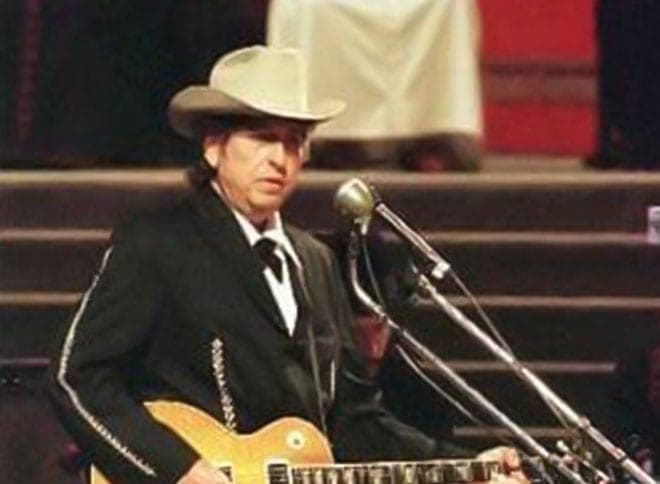ROME – When Pope Francis took a shot at the bands Queen and Florence + The Machine in his annual Lenten message released today, it was merely the latest chapter in a love/hate story between popes and rock-and-roll.
Since the birth of rock in the late 1940s, popes have run alternately hot and cold about it – sometimes deriding rock as a “vehicle of anti-religion,” while at others hailing its potential to be a sort of pre-gospel, offering what St. Justin Martyr in the second century would have called Logos Spermatiko, or “Seeds of the Word.”
From the beginning, there’s been an assumption of animus between popes and rock, given that rock-and-roll incarnates the rejection of tradition and authority, two things of which popes generally serve as the world’s preeminent representative.
So strong was the presumption of mutual dislike that when The Beatles released their ballad “Fool on the Hill” in 1967, a track from the film “Magical Mystery Tour,” many critics took it as a mocking reference to Pope Paul VI, now St. Paul VI.
The relevant lyrics were:
Day after day, alone on a hill
The man with the foolish grin is sitting perfectly still
Nobody wants to know him
They can see that he’s just a fool
But he never gives an answer
That interpretation, by the way, made the rounds even before 1968, when Paul VI issued his famous encyclical Humanae Vitae reaffirming the Church’s traditional ban on birth control, a stance not broadly welcomed among many devotees of “sex, drugs and rock-and-roll.”
Yet popes have not always been uniformly contemptuous.
St. John Paul II, for instance, famed for his keen understanding of youth culture, sometimes wove references to rock-and-roll into his pastoral outreach.
In 1997, the Polish pope took part in a Eucharistic Congress in Bologna, Italy, during which Bob Dylan performed three of his most famous tracks — “Knockin’ on Heaven’s Door,” his 1960s anti-war classic “A Hard Rain’s A-Gonna Fall,” and “Forever Young.”
John Paul then commenced, to use the appropriate musical term, to “riff” on Dylan’s famous ballad “Blowin’ in the Wind.”
The Polish pope told the crowd of some 300,000 young Italian Catholics that the answer was indeed “in the wind” — but not in the wind that blows things away, rather “in the wind of the Spirit” that would lead them to Christ.
He went on.
“You asked me: How many roads must a man walk down before you call him a man? I answer you: one! There is only one road for man and it is Christ, who said: ‘I am the way.’ He is the road of truth, the way of life.”
(In a typical Dylan touch, he then declined to play “Blowin’ in the Wind,” substituting “Forever Young” – which, in a way, was a great choice for the founder of World Youth Day and a pope who inspired a unique devotion among young followers.)
In a news conference teeing up the concert, Monsignor Domenico Sigalinini, a spokesman for the Eucharistic Congress, actually apologized for neglect of rock-and-roll, adding that John Paul II wanted “to get closer to young people through pop music, which unfortunately for many years has been viewed with suspicion and indifference by the Church.”
Over the years, John Paul would welcome B.B. King to the Vatican (who presented the pontiff with one of his trademark “Lucille” guitars) along with Ricky Martin, Jewel, and Cleopatra. He also met with U2 front man Bono to talk about reducing third world debt during the Great Jubilee year of 2000.
“He’s one of the great showmen of the 20th century,” Bono said, dubbing him “the first funky pontiff.” John Paul even donned a pair of the singer’s legendary wrap-around shades.
In January 2004, a little over a year before his death, John Paul watched a Vatican performance by break-dancers from Poland who had done charity work for disadvantaged children. The pope applauded, saying, “For this creative hard work, I bless you from my heart.”
However, John Paul’s embrace of rock wasn’t universally shared in the Church’s upper echelon.
Then-Cardinal Joseph Ratzinger had opposed the 1997 encounter with Dylan, as Ratzinger himself acknowledged in a 2007 memoir of his predecessor after he had become Pope Benedict XVI.
“There was reason to be skeptical — I was, and in a certain sense I still am — [reason] to doubt if it was really right to let these types of prophets intervene,” the German pope said, who in a 1986 interview-book had described rock-and-roll as a “vehicle of anti-religion.”
As for Francis, his shot at a couple of rock lyrics notwithstanding, he’s also proven to be on friendly terms with at least some rockers. For instance, he too met Bono in 2018, after which Bono said that the two men had developed “a crush on each other.”
In that sense, Francis is the story of recent popes in miniature – friendly to rock-and-roll some days, hostile on others. From a glass-half-empty point of view, that ambivalence could be seen as a lamentable chapter in a wider breach between faith and culture.
On the other hand, Francis himself released a rock album, after a fashion, in 2015, entitled “Wake Up!” and composed of recordings of his speeches set to pulsating tunes by various Italian bands. So, perhaps, while the breach between popes and pop may have its moments, it’s hardly insurmountable.











